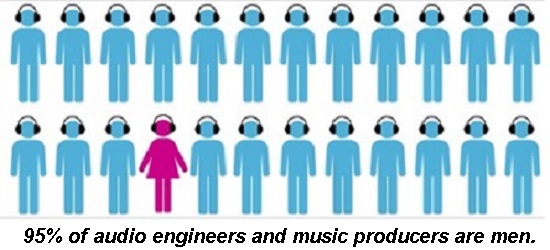This week I was once more asked a question that has been a recurring theme during my career. I’ve lost count of the number of times I’ve been asked to comment on why there aren’t more women in the music business, and my answer has always been the same – I’m the wrong person to ask because I am a woman in the music business. I can’t comment on why someone wouldn’t want to be a part of this, for the very reason that I wanted it more than anything. I’m fortunate to be able to say that after 23 years in the industry I’ve done everything I set out to do and quite a few things that I didn’t. I’ve toured with numerous theatre, arena and stadium productions; mixed monitors for bands whose albums I had as a kid; run sound for the Queen at Buckingham Palace; been paid to travel the world; and been in charge of monitors at the world’s biggest greenfield festival. It hasn’t all been smooth sailing, but neither has it been the sexism-infused nightmare that some people seem to imagine. Indeed, some people seem almost disappointed when I tell them it really hasn’t been that bad, and it has me wondering: is it this idea of victimisation that puts some women off?
Now it’s possible that I walk around with my head in the clouds and don’t notice sexist behaviour, but I think it’s more likely that I’ve simply learnt to pick my battles. If I called a tribunal every time someone made a sexist crack I’d be in court for the rest of my life; but there’s a world of difference between sexist cracks and true misogyny. Tribes of people (i.e. a crew) naturally seek out what is different about a newcomer and zero in on that to test them. A smart newcomer will give as good as they get in return, show themselves to be a valuable commodity to the existing tribe, and in doing so establish common ground and become accepted. It would be a mistake to think that cracks are made simply because I’m a woman; anyone who’s heard crew banter will know that it can be brutal between guys, and the only reason gender is raised is because it’s the most obvious difference.
I can count on one hand the number of times that I’ve encountered true misogyny. Whilst I did speak up for myself at the time, in every case, I also found that the best possible response is simply to prove them wrong.
One odious production manager told me I’d never make it unless I learnt to open my legs. My satisfaction upon seeing him at an industry event many years later, wearing a badge stating my position at the PA company I worked for and having very much made it without doing any such thing, was immense. I didn’t need to say anything – the look that passed between us said it all.
Not long ago I ran into someone who bullied me for a period of time in my early days. Back then he was senior to me (though not by much) and was fond of telling me how useless I was. But now, many years later, the status quo was reversed, and I was in a very much senior position to him. It made me realise just how far I’d come, and that bullies are, as we all know, just fearful cowards. I considered taking him to task in defence of my younger self but decided against it. He now cut such a pathetic figure that I felt no need to make explicit who was the winner here – it was obvious.
And the sorry behaviour from a couple of local crew whom I encountered in the States just seems laughable now, as it did then – how sad, to have to get your fun by trying to tear others down. I’ll bet their lives aren’t a barrel of laughs – after all, people who are secure in their own talents just don’t do that. How small they must feel, in their quieter moments. Not to mention having the entire visiting crew now think you’re a complete idiot. (Wait, you didn’t think I’d keep their nonsense to myself did you? Oh, their cracks were far too amusing not to share them with my compatriates – and the guys on a tour soon become like brothers who are very much on their sister’s side!)
So my point is this: if a young woman likes the idea of a career in live music, she shouldn’t worry too much about being in the gender minority, because she’ll quickly get used to it, and most guys are decent folk. The things for her to concern herself with are working hard; learning all she can about her chosen field; forging alliances; and yes, building resilience and comebacks to wisecracks. Learning to tell the difference between crew banter and abusive behaviour is important because the former is far more common than the latter. On the (hopefully) rare occasion that she does experience abusive or inappropriate behaviour she should always call it out, whilst also knowing this: that the best response she can ever give to her detractors is simply to prove them wrong.
